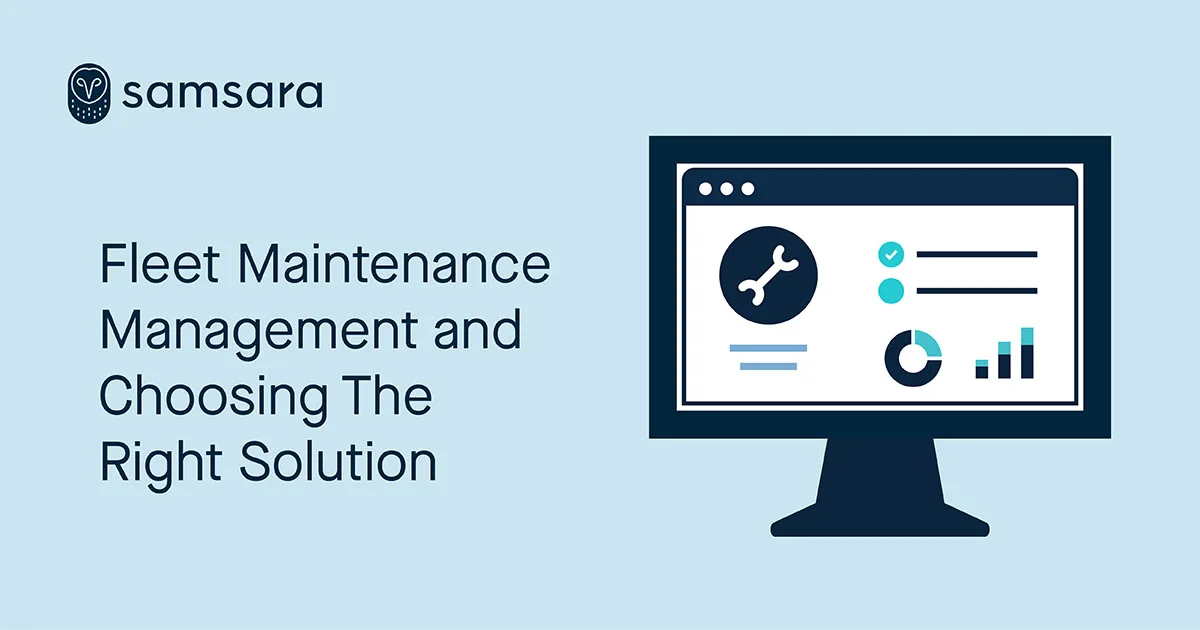The Importance of Fleet Maintenance Management and How to Choose the Right Solution
July 28, 2020

Get Started with Samsara
Check our pricesKey Takeaways
Fleet maintenance management reduces your fleet's downtime—proactive vehicle maintenance can also reduce the risk of accidents and last-minute repairs. Without a comprehensive maintenance management solution, fleets are more susceptible to costly malfunctions.
Managing a fleet of vehicles can be a logistical challenge. But with the right fleet maintenance management software (FMMS), you can track vehicle data and produce actionable insights to help your business. Fleet maintenance management software enables you to track all aspects of your vehicles in real time, from maintenance schedules and refrigerated asset temperatures to fuel usage. The insights learned from this data can help improve safety and efficiency across your fleet, saving your company from unforeseen issues or on-the-road maintenance.
Maintenance software can also be tailored to your business’ specific operations, whether it’s ride-sharing in a busy metropolitan area or transporting consumer goods or industrial parts cross-country. Maintenance management solutions are also scalable. This makes them suitable for both small businesses with a handful of vehicles and large fleets with hundreds or even thousands of vehicles.
Read on to learn how fleet maintenance software can improve your fleet’s productivity, safety, and vehicle longevity—all while improving your bottom line.
What is fleet maintenance management?
Fleet maintenance management refers to all aspects of keeping your fleet running smoothly on the road. Use maintenance management software to:
Track individual vehicles during deliveries and maintenance
Plan efficient routes that avoid traffic and construction zones
Schedule preventive maintenance to avoid mechanical issues
Identify potential engine issues and harsh driving events
Schedule deliveries and routes in real time
A fleet maintenance management system leverages software and hardware, which provides you with real-time data that can be accessed remotely. For example, fleet managers have the option to integrate the Samsara AI Dash Cams with a complete fleet management system. They can then view footage of both their drivers and the road in front of them. This makes it easy to identify and flag harsh braking events that put wear-and-tear on your vehicles.
During a safety-related accident or a vehicle breakdown, maintenance management systems can also improve your response time with real-time GPS. Instead of calling your driver for their location, you can see where the issue occurred and respond without delay or downtime.
Why is fleet maintenance management important?
The short answer is it reduces your fleet’s downtime—proactive vehicle maintenance can also reduce the risk of accidents and last-minute repairs. Without a comprehensive maintenance management solution, fleets are more susceptible to costly malfunctions and missed opportunities. Poorly maintained fleets often experience these three common problems:
1. Unavailable vehicles or late deliveries due to vehicle issues
When an engine fault code or breakdown prevents your trucks from hitting the road, fewer vehicles can fulfill deliveries. Obstacles that stand in the way of on-time deliveries cause customer satisfaction to plummet, so fleet managers should take a preventative maintenance approach to avoid unexpected breakdowns to minimize the chances of late deliveries. Smart fleet maintenance solutions can cut the time you spend dispatching mechanics by immediately alerting them of vehicle defects.
2. Streamline compliance and paperwork
Logging miles and recording vehicle maintenance on paper wastes your workers’ time and slows down your fleet. Digitizing fleet maintenance management means it’s easier to track your vehicles on the road and in the shop. Software updates easily ensure that your fleet is following the latest regulations.
3. Poor vehicle longevity and frequent replacement
‘Idling’ is when an engine is running but the vehicle itself is not in motion. Excessive idling time speeds up wear and tear on your vehicles and increases fuel costs. The Environmental Protection Agency estimates that fleets can save up to $6,000 a year per vehicle by reducing their idling time and optimizing fuel usage.

5 ways fleet maintenance management software can help your fleet:
With your fleet always on the go, regular maintenance can be a daunting task for busy managers. But with fleet maintenance software, maintenance schedules and alerts can be automated. For example, the software tracks when a vehicle is due for service, and will list the vehicle as unavailable when it’s in the shop. This automation allows fleet operators to focus on other high-level goals. Here are five key benefits that fleet maintenance solutions can bring to your operations:
1. Increase predictability
Road breakdowns cause expensive and potentially dangerous delays and gaps in your service. Fleet maintenance management software lets you avoid breakdowns by keeping vehicles on a regular preventative maintenance schedule. For instance, you can receive an alert if there’s an issue like a failing battery or engine fault codes. Getting insight into these issues sooner can help you avoid unexpected breakdowns, saving your fleet time and money by reducing instances of late deliveries, cancellations, and disappointed customers.
2. Improve maintenance
Proactively identifying vehicles in need of service extends the vehicle’s health and lifetime. Certain telematics solutions offer unprecedented visibility into vehicle diagnostics, enabling fleet managers to implement proactive vehicle maintenance. Fleet maintenance software, like Samsara, helps you anticipate planned maintenance downtime. You can also schedule corrective maintenance activities by using an all-in-one platform. If your fleet has an auto repair division, automatic maintenance task scheduling can help streamline your operations. The team’s work orders will proceed smoothly and avoid backlogs of vehicles waiting for upkeep or parts. You can also auto-schedule predictive maintenance reminders and provide visibility across your operations by allowing your maintenance manager to access the Samsara dashboard. This allows every stakeholder to make data-driven decisions fast, from anywhere.
3. Enhance safety
Safety is a top priority for fleets, and vehicle maintenance plays a central role in your safety record. Engine troubles and poorly maintained vehicles can risk your team’s lives and other drivers on the road. But gathering vehicle data across every truck in your fleet can feel like a tedious task. Luckily, instead of manually documenting safety-related incidents, managers can use tools like AI dual dash cams. These dual-facing dash cams use Artificial Intelligence to provide insights into driving behavior and help you intervene when unsafe driving is detected.
4. Data-driven decisions
For fleet and maintenance managers juggling too much information about their operations, cloud-based technology can help maximize the efficiency of your data. All-in-one telematics solutions provide quick and easy access to fleet data and make informed decisions about everything from maintenance to live routing, without the headaches of paperwork and endless calls.
5. Increase your bottom line
Fleet maintenance software increases your fleet’s overall efficiency by keeping every vehicle in top shape, improving asset management, and lengthening vehicle lifetimes. This means fewer replacement vehicles and more resources.
How to choose the best fleet maintenance management software
There are many maintenance and vehicle management solutions to choose from. While it’s important to identify which aspects are central to your operations, there are some features that you should look out for:
1. A comprehensive dashboard
Your maintenance management system should be an all-in-one solution that integrates your fleet’s maintenance strategy with other operational needs. Dashboards should be user-friendly, allowing you to view real-time route progress and maintenance alerts at a glance. When you’re away from your desk, solutions with a mobile application help you stay informed anytime and anywhere.
2. Real-time visibility and alerts
Detailed updates based on mileage and engine hours help with preventative maintenance scheduling. Most maintenance management tools alert you when vehicles are due for maintenance and automatically flag past-due vehicles. This helps you repair problematic vehicles before they become a liability.
3. Regulatory compliance features
Long-distance drivers must follow federal and local laws on safety and Hours of Service. This data is easily logged using the Samsara fleet maintenance management system.
4. Scalability
As your business grows, you need software that can scale with it. The right vehicle management software is flexible enough to keep track of your fleet, no matter how many vehicles you have.
5. An open application programming interface (API)
An open (or public) API lets developers build powerful tools to leverage the sensor data collected from your vehicles. It’s crucial to have a customized solution that fits the needs of your business. You’ll want fleet maintenance management software that can communicate, interact, and share data with other applications. Look for the ability to track and analyze sensors, vehicles, and entire fleets.
6. Enterprise-grade security with single sign-on authentication
Reduces security risks and password fatigue while maximizing secure user access to your system. Role-based permissions offer another layer of security, giving your system administrator control over user access. Enterprise-grade security is especially important as smart cars and electric vehicles are implemented in fleets.
7. Real-time customer support by phone and email
When issues arise, you need to reach your fleet solutions company without difficulty. Around the clock support ensures that business operations are uninterrupted, and clients can rely on you to deliver your service.
How Samsara helped Boston’s public transportation system boost bus predictability
The Massachusetts Bay Transit Authority (MBTA) bus system transports over 450,000 people across the city each day. MBTA officials noticed that because of outdated GPS software their bus times were unreliable, and feared a decline in ridership. They turned to Samsara’s fleet maintenance management system for help with tracking buses on their routes, streamlining repairs, and improving customer support. Installing Samsara’s Vehicle IoT Gateway devices on buses, which provide real-time GPS data, the MBTA improved bus schedule predictability by 10%. The Samsara open API sends this data to the MBTA which disseminates it to riders through mobile apps and bus stop signage. Samsara’s fleet maintenance management software also facilitated improved dispatching, provided better customer support, and accurately tracked maintenance work.
One example of improved bus predictability was on one of the MBTA’s most important routes. Before, when the Silver Line bus to Boston Logan International Airport went underground, there was no communication with the vehicle. This lack of data caused significant problems with predicting bus arrivals and left airport travelers in danger of missing their flights. Using Samsara Vehicle Gateways, the MBTA can now track the Silver Line in real time, ensuring that passengers make their flights with time to spare.
With over 1,000 buses and 15 maintenance yards throughout the area, Boston’s bus maintenance crew used to spend hours locating buses and confirming maintenance needs. Now, the MBTA uses Samsara’s remote diagnostics to access real-time information about engine problems and pinpoint the bus’s exact physical location.
An efficient and comprehensive vehicle management system
Samsara fleet maintenance management software can track and improve fleet maintenance, from analyzing individual driver behavior to informing your maintenance crew which spare parts they might need ahead of time.
Fleet managers who use Samsara can simultaneously check engine performance indicators, record speeding drivers, and monitor refrigerated assets’ temperatures. Thanks to historical fleet performance data and real-time emergency alerts, their fleets operate more safely and efficiently.
See for yourself why Samsara is trusted by more than 15,000 fleets across the United States. Request a free trial to get started today—we’ll ship you our fleet maintenance management system to try free for 30 days, along with access to our online dashboard and expert support team.
Learn More About Samsara